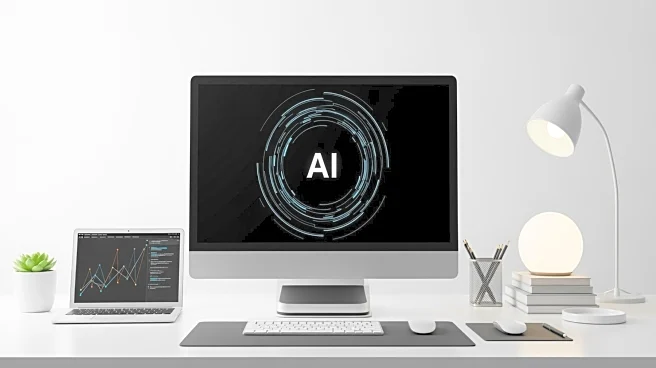What's Happening?
Keith Riegert, president of the Stable Book Group, has emphasized the necessity for publishers to integrate artificial intelligence into their operations during the Sharjah Publishers Conference. Riegert described AI as both transformative and unsettling,
noting that it represents the most significant change he has witnessed in two decades. His company has adopted a business-wide OpenAI license, costing approximately $600 monthly, which he claims pays for itself through productivity gains. Employees are required to use AI for at least an hour daily, treating it as an intelligent but inexperienced assistant. This approach aims to automate menial tasks and free staff for creative work, although it comes with trade-offs, such as junior editors losing opportunities to develop certain skills. Riegert demonstrated AI's capabilities by showcasing a five-agent workforce that produced a complete book in five minutes, highlighting the potential flood of AI-generated content in the industry.
Why It's Important?
The integration of AI tools in publishing is significant as it represents a shift in how the industry operates, potentially leading to increased efficiency and reduced costs. However, it also raises concerns about the displacement of jobs and the quality of AI-generated content. The rapid advancement of AI technology could lead to mass unemployment, particularly affecting those in tech who initially developed these systems. The industry faces challenges in managing AI-generated content, as seen with the emergence of clones of Kara Swisher's biography before its official publication. This development underscores the need for publishers to adapt to AI or risk being left behind, as well as the ethical considerations surrounding AI's impact on employment and content creation.
What's Next?
Looking ahead, Riegert outlined two potential scenarios: exponential AI growth leading to humanoid robots and mass unemployment, or a scaling plateau triggering economic collapse. The publishing industry may need to develop strategies to manage AI-generated content and address the ethical implications of AI's impact on employment. Stakeholders, including publishers and tech developers, will likely continue to explore ways to harness AI's capabilities while mitigating its negative effects. The industry may also see increased efforts to regulate AI-generated content and protect intellectual property rights.
Beyond the Headlines
The deeper implications of AI integration in publishing include ethical concerns about job displacement and the quality of AI-generated content. As AI becomes more autonomous, it challenges traditional roles and skills within the industry, potentially leading to a reevaluation of workforce needs and training. The rise of AI-generated content also poses legal and cultural questions about authorship and originality, prompting discussions on how to preserve the integrity of creative works. These developments may influence broader societal attitudes towards AI and its role in various industries.
















